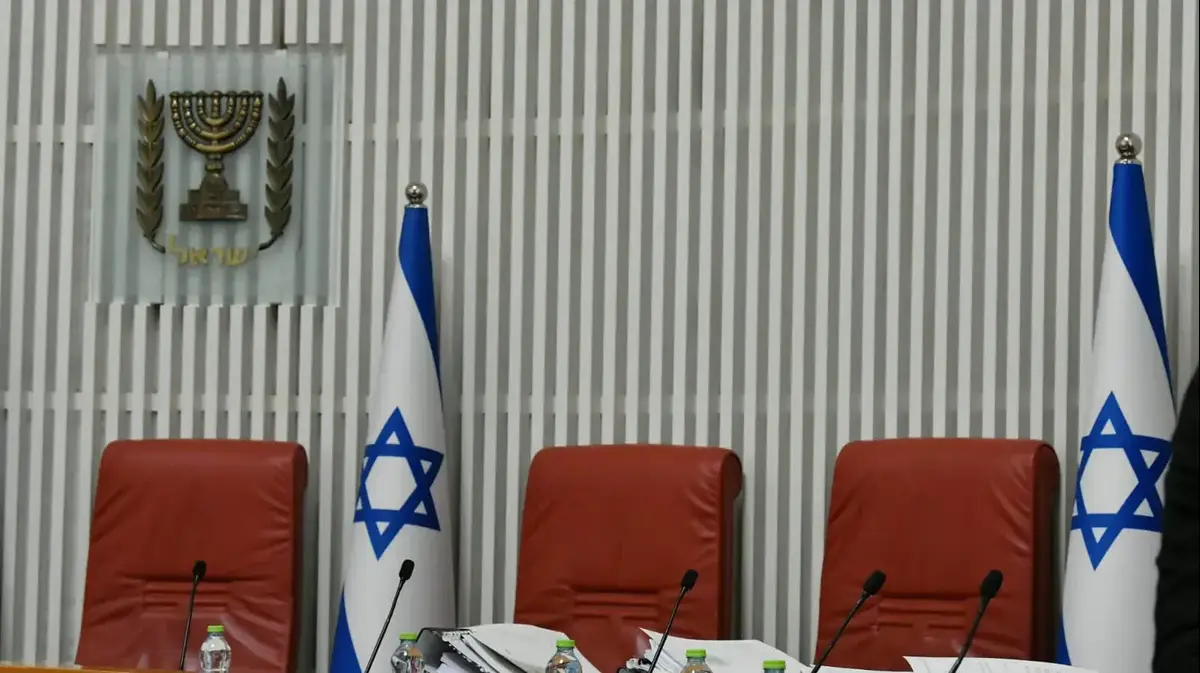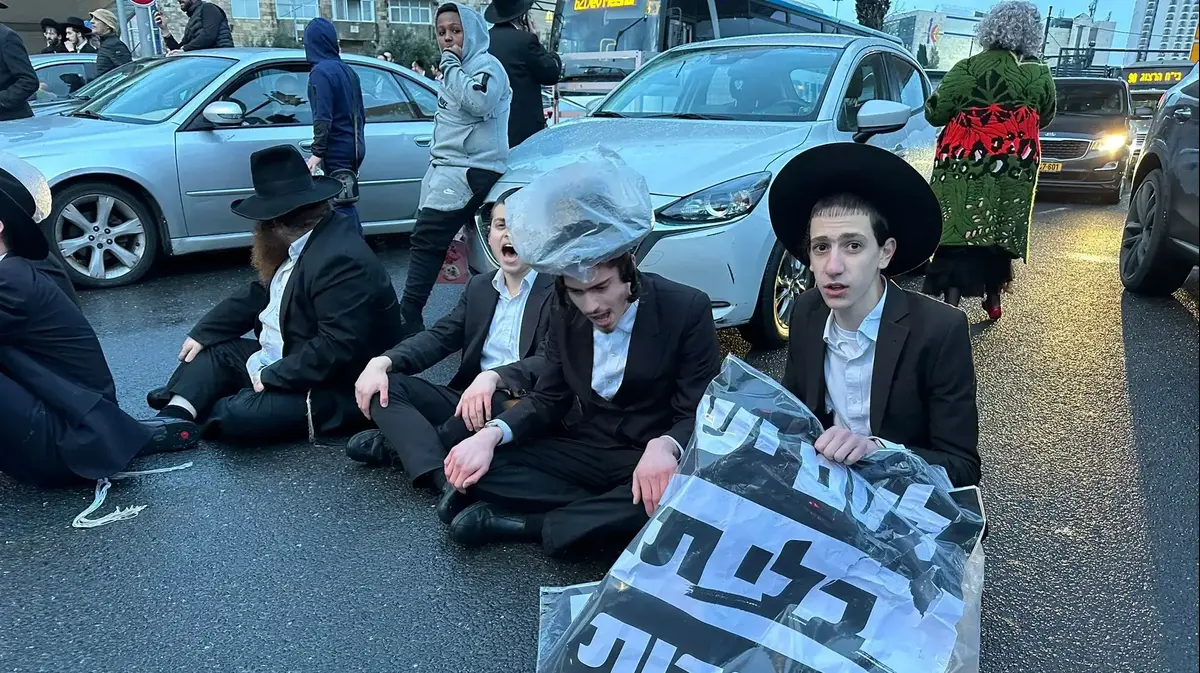news
News in Israel
Criminal news and law
Those who want to discriminate against Arabs are not waiting for the High Court ruling on the Nationality Law
The High Court signals that it does not intend to invalidate the Nationality Law, hoping that an interpretation of the law will stop those who already use it to justify minority discrimination. But even the judges' silk gloves do not provide the people who push to "burn the club."
Tags
Nationality Law
Supreme Court
Yariv Levin
Daniel Dolev
Friday, 25 December 2020, 18:33
Share on Facebook
Share on WhatsApp
Share on general
Share on general
Share on Twitter
Share on Email
0 comments
The 23rd Knesset was dissolved, the elections on March 23, December 23, 2020
Forecast: Partly cloudy and possible local rain 14.12.20
Biden got vaccinated against Corona live: "Nothing ...
Shirbit CEO: "We are working for a quick return to activity ...
Double by Kim Kardashian
Protest at the national headquarters in Jerusalem, following the killing of her beloved boy ...
Netanyahu: Israel will be the first country to emerge from an epidemic ...
Director General of the Ministry of Health: "We may ask to extend the closure ...
A conversation between a villain and one of the agents reveals the method of poisoning: ...
Report in Syria: Israel attacks two targets near Quneitra ...
A blizzard in New York hits Corona, December 17 ...
In the video: Results of the vote on amending the Nationality Law (Photo: Knesset Channel)
No less than nine hours were spent by judges of the High Court this week on hearings in 15 petitions filed against the Nationality Law. For equality, and that it cannot justify discrimination against non-Jews.
"As we read the Knesset, the decisive trend is that they wanted to preserve the principle of equality as reflected in the Basic Law of Human Dignity and Liberty, and as interpreted by this Court.
What more than that? "Judge Solberg asked at the hearing. Justice Mazuz added to one of the petitioners:" My lord assumes a conflict (between equality and the Nationality Law. D.D.). I do not call a conflict. Article 7 states that the state will work to encourage Jewish settlement, and he does not "Conflicts with the right of every Arab, Druze, Circassian, or any other foreigner to receive a land allotment."
Even if we ignore Judge Mazuz's reference to non-Jewish citizens as "foreigners," he describes here what is called in legal parlance "sustainable interpretation."
Instead of pulling out the heavy guns - disqualifying the law or parts of it - the judges prefer more subtle tools, of interpretation.
This is also the position of Spokesman Mandelblit.
More on Walla!
NEWS
The High Court hears petitions against the Nationality Law: "Make an effort to preserve the value of equality"
To the full article
More on Walla!
NEWS
Spokesman for the High Court: "Strongly opposes judicial intervention in the Nationality Law"
The Knesset rejected the proposal to amend the Nationality Law, 7 MKs from White Brush voted against
Druze and Circassian authorities protest against government: "We will not give up until full equality"
Istanbul is open - an hour away from a natural and regular solution for female pattern baldness
Prefer the interpretive tool.
Debate on the Nationality Law, December 22, 2020 (Photo: Paul Photographers, Shalev Shalom, Yedioth Ahronoth)
The problem is that at the moment there are already those who interpret the law differently.
For example, Registrar Yaniv Luzon of the Krayot Magistrate's Court, which was based on the Nationality Law, ruled that the Jewish city of Karmiel has no obligation to fund transportation for Arab students living there to an educational institution that speaks their mother tongue.
Judge Moshe Drori of the Jerusalem District Court did the same, awarding increased compensation to a terrorist victim who sued Hamas, based in part on the Nationality Law.
This is a welcome ruling, but the question is what would have happened if the plaintiff had been the victim of terrorism who is an Arab citizen, or even if the plaintiff was a Palestinian who was harmed by a Jewish terrorist.
Even then, could the law of nationality have justified increased compensation, or perhaps quite the opposite?
For example, the IPS translates its procedures and orders into Arabic. The reason: the Nationality Law. Zalmon Prison, April 2017 (Photo: Reuven Castro)
It can be assumed that if the Supreme Court issues a clear and explicit ruling regarding the correct interpretation of the law the lower courts will act on it.
But the reality takes place mostly outside the courts.
Last July, the Association for Civil Rights, one of the petitioners against the law, turned to the IPS because the service refused to translate its procedures and orders into Arabic. The reason: the Nationality Law. A petition can be filed in court against decisions such as the IPS.
But the reality is made up of countless small cases, only a tiny fraction of which come to court for one reason or another.
Will the Supreme Court's interpretation succeed in permeating every decision of any administrative authority?
For any discussion on land allocation?
Will this interpretation succeed in overcoming - not in the courts, but in everyday life - the clear language of section 7 of the law, which gives priority to Jewish settlement - and thus supposedly an instrument of discrimination against Arabs in the allocation of land?
In this sense, the "sustainable interpretation" proposed by the High Court is currently, at most, a promising interpretation. In the future, it remains to be seen whether it also holds.
The main points of the controversial Nationality Law
The Land of Israel is the historical homeland of the Jewish people, in which the State of Israel was established
The State of Israel is the nation state of the Jewish people, in which it exercises its natural, cultural, religious and historical right to self-determination.
The realization of the right to national self-determination in the State of Israel is unique to the Jewish people
Hebrew is the language of the state, the Arabic language has a "special status"
The state considers the development of Jewish settlement a national value, and will work to encourage and promote its establishment and establishment
The bullying letter of the Speaker of the Knesset
Despite the judges' apparent unwillingness to even consider interfering with the content of the law, they still received harsh criticism from the right.
Why?
Because they agreed to hold a hearing and did not reject the petitions outright.
Professor Yaniv Rosnai of the Interdisciplinary Center, a world-renowned expert on constitutional law, tried to explain on Twitter that the court could not avoid such a hearing.
"The Knesset itself has explicitly written in the Basic Law of the Knesset and in the Basic Laws on Human Rights, in the rules of ethics of Knesset members and in other laws that the fundamental values of the State of Israel are to be a Jewish and democratic state," Rosnai wrote.
"What does it mean to have basic values? What is their legal status? These are weighty questions that should be clarified by the court. But in order to discuss and decide them - the court had to discuss the petitions ... this is exactly the role of the court. "Conflict between two basic laws? He cannot do the contradiction without a decision. This decision stems from his role as the court."
On the morning of the hearing, in an act that is difficult to determine whether there is more bullying or impudence, Levin sent a letter to Supreme Court President Esther Hayut, writing that "the very Supreme Court hearing on matters "According to Levin," any decision to interfere with the Basic Laws passed by the Knesset will be a decision made without authority and therefore also invalid. "
Knesset Speaker Yariv Levin (Photo: Knesset Spokeswoman, Danny Shem Tov)
Here, in an official letter bearing the symbol of the Knesset Speaker's Office, it becomes clear that the court is no longer the authorized interpreter of the law in Israel. This is not even the Knesset plenum. The Speaker alone will decide on the status of laws, as well as the Supreme Court. They are valid or not.
It seems that Chairman Levin is trying to compete with the strength and boldness of his predecessor, Yuli Edelstein, who simply decided at the time not to uphold an explicit High Court ruling.
But those who want to give the parliamentary majority power without any restrictions, including the power to trample on the minority and change the rules of the democratic game, to make sure that he himself remains in power, would not be satisfied with the High Court rejecting the petitions outright. Petitioners would be required to pay expenses. If they were to incur expenses, they would also be required to throw them in jail. Because the goal is not one petitioner or another. The goal is a submissive and disciplined High Court that is afraid to do its job and keep the minority from being abused by the majority.
It seems that the precise interpretation of this situation was given by the pale tracker in the sketch "Songs and Gates and Technicians", back in 1980, when the radio interviewer turned to an angry football fan and asked what his demands were.
"So like that, we want to determine who the referees will be," the fan replies, "and if not, we have decided to burn down the club."
But after that it turns out that he has a few more requirements.
"So like that, we want 15 wins a year minimum. 15, yes? We also want to determine once and for all who will be the players, who will be the coaches, what will be the result, and who will be the weather."
"And if it is not given to you?"
"We'll burn the club down."
The difficult dilemma facing many judges
This week, a ruling was published here by the Tel Aviv District Court, which decided not to send to prison two defendants convicted of importing and trading more than 70 liters of "rape drug", and contented himself with service work.
The main reason was the rehabilitation procedure in which the two began, and even progressed in it in a promising manner.
Sending them to prison, according to the probation service, would have severely hampered the process, and could have sentenced the two to life in crime.
It is difficult to think of a case that better illustrates the dilemma of a judge having to impose a sentence.
On the one hand, the blood boils when one thinks of crime victims.
Whether it was women or men who were raped with the help of the tasteless and odorless sedative drug, or whether it was those who used it as a party drug, and may have become addicted.
The basic, primal feeling is that whoever commits a crime should suffer a significant punishment.
He needs to feel her.
To suffer from it.
More on Walla!
NEWS
Dozens of kilograms of rape drug will be brought in and sentenced to service jobs: "Allow them to recover"
To the full article
Rape drug smuggled at Ben Gurion Airport (Photo: Israel Police)
On the other hand, criminals sentenced to imprisonment often come out of prison more sophisticated and dangerous criminals.
It is precisely the desire to "reward" them for their actions with suffering that often makes them resentful towards society, and more willing to break its laws.
In other words, society has an interest in rehabilitating criminals and bringing them back into the groove as ordinary citizens.
A society that rehabilitates criminals instead of "upgrading" them in prison is a safer society.
The importance of a sense of justice must not be underestimated, and it must be remembered that this dilemma is not only of the judges.
It is the dilemma of Israeli society as a whole.
Only if the Israeli public can free itself from the feeling that a criminal who is not sent to change long prison terms is a sinner who comes out hired, can rehabilitative reforms succeed.
It can make Israel a safer society in the long run, but it must not lose the public's belief that justice has indeed been done in the courts.
Share on Facebook
Share on WhatsApp
Share on general
Share on general
Share on Twitter
Share on Email
0 comments









